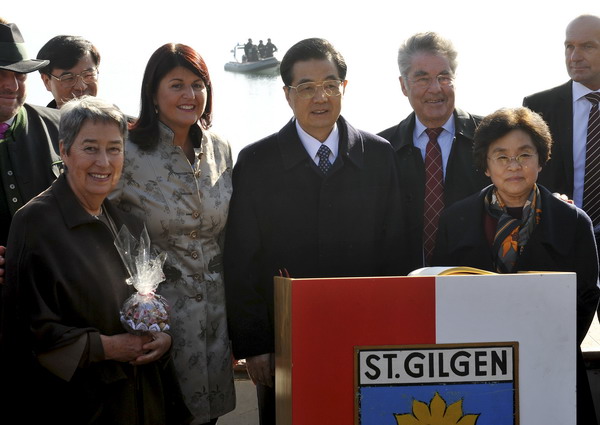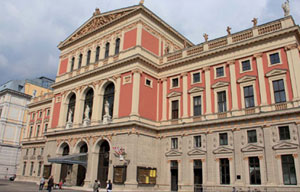Hu's trip fosters cultural exchange
Updated: 2011-11-02 07:48
By Wu Jiao (China Daily)
|
|||||||||
|
 President Hu Jintao and his wife Liu Yongqing are welcomed to St Gilgen in the Austrian province of Salzburg, on Tuesday. Austrian President Heinz Fischer (third from right), and his wife Margit Fischer (left) accompanied Hu on the trip. [Photo by Kerstin Joensson/Associated Press]
|
But the current visit to Austria is an exception to the rule.
Hu has visited the Austrian National Library in Vienna and a farm in Salzburg, hometown of 18th-century composer Wolfgang Amadeus Mozart.
Hu and his wife Liu Yongqing traveled by car early on Tuesday morning through the autumn fog that shrouded the mountainous region of St. Gilgen, about 28 km from Salzburg city, to visit the Urbanhof farm, which is run by Joseph Haas and his family.
Hu was informed of the farm's operations and how milk was taken to market.
The farm produces 610 tons of milk annually from its herd of more than 100 cattle. The family spans the generations. The eldest is over 80, the youngest just 3.
Yet only three members of the family work on the farm as the others have opted to make their lives in the city.
China could learn how to manage such a large farm with so few hands, Hu said.
Sepp Haas will eventually inherit the farm and would, one day, like to sell his products in China.
Salzburg, Austria's fourth-largest city, is the capital of the province of the same name. Apart from its ornate buildings, it is renowned as the birthplace of the 18th-century composer, Mozart.
Hu is set to attend a concert performed by the country's leading musicians later on Wednesday.
Many readers may be familiar with Salzburg's scenery even though they have never been to Austria.
Its rolling hills and mountains provided the backdrop for the Hollywood movie The Sound of Music.
The city also played pivotal roles in the careers of 18th-century composer Johann Michael Haydn and noted turn of the century writer Stefan Zweig. It provides a perfect example of the marriage between art and commerce.
While paying a visit to the Austrian National Library in Vienna on Monday afternoon, one of the most beautiful in the world, Hu was introduced to some ancient Chinese books that a Western missionary brought back to Austria in the 17th century.
Hu said those books bear testament to the links of the two cultures over centuries.
Hu presented the library with a traditional Chinese vase, with an edelweiss, the Austrian national flower, printed on its surface.
The promotion of cultural understanding and exchanges has been one of the priorities of Hu's visit to Austria.
The president's trip, the first by a Chinese president in 12 years, conveys the message of cultural exchange.
A number of agreements have been signed on the trip, covering green technology, the economy and cultural exchanges.
Among those agreements, the University of Vienna is to continue its cooperation with related Chinese institutions in further developing the Confucius Institute which teaches Chinese culture and languages.
It is a platform for cultural exchanges, said Richard Trappl, chairman of the Confucius Institute under the University of Vienna.
Also, the China Arts and Entertainment Group set up a joint venture of cooperation with the Austrian art dealer Wiener Stadthalle. This will allow the best art products from both countries to be viewed by more people.
The days of sightseeing are drawing to an end. The president is set to travel to the French resort of Cannes to attend the G20 summit, which kicks off on Thursday.
He is expected to hold talks with IMF chief Christine Lagarde and other leaders of the G20.











